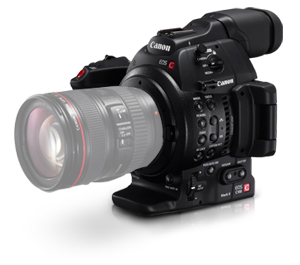Canon EOS C100 Mark II Digital HD Camera employs the same single Super 35mm Canon CMOS image sensor
Product Code: EOSC100MARKII


Features:
• Full range of EF mount lenses supported
• 8.3MP Super 35mm CMOS sensor
• Dual Pixel Auto Focus feature
• Face detection AF support
• High sensitivity, low noise
• Canon Log and Wide DR gamma
• In-built wireless features
• GPS support via GP-E2
• Clean uncompressed HDMI signal
Click here to view Specifications
The new and improved Canon EOS C100 Mark II offers fast the ability for fast turnaround time to match existing workflows in a compact configuration. Loaded with powerful features and enhanced ergonomics, the EOS C100 Mark II is ideal for solo operations such as run-and-gun style shoot coverage as well as operation on cranes, sliders and unmanned drones. Designed to be used right-out-of-the-box, many would find the learning curve of the EOS C100 Mark II, a gradual and pleasant one.
Dual Pixel CMOS AF Technology
The CMOS sensor in the
Canon EOS C100 Mark II utilize two separate photodiodes for each pixel in order to achieve high-speed readout.
With full rein given to these characteristics, the sensor is capable of detecting two image signals from each pixel. By initiating phase-difference AF, focusing is executed at a higher
speed than contrast AF using all the EF lenses.
AVCHD/MP4 and 59.94p/50p supported
Users can choose from multiple formats that support AVCHD or MP4 to suit the applications at hand. Images are recorded at the maximum bit rate of 28 Mbps or 35 Mbps in each case.
NTSC/PAL switchable, and 59.94P/50P frame rates supported, and each and every individual frame of moving subjects is recorded beautifully.
Continuous Recording Function
A continuous recording mode ensures that all shooting opportunities will never be passed. All the images from start to finish in this
mode are recorded, and the video recording start and end operations performed using the controls on the camera body are recorded as the IN point and OUT point metadata.






